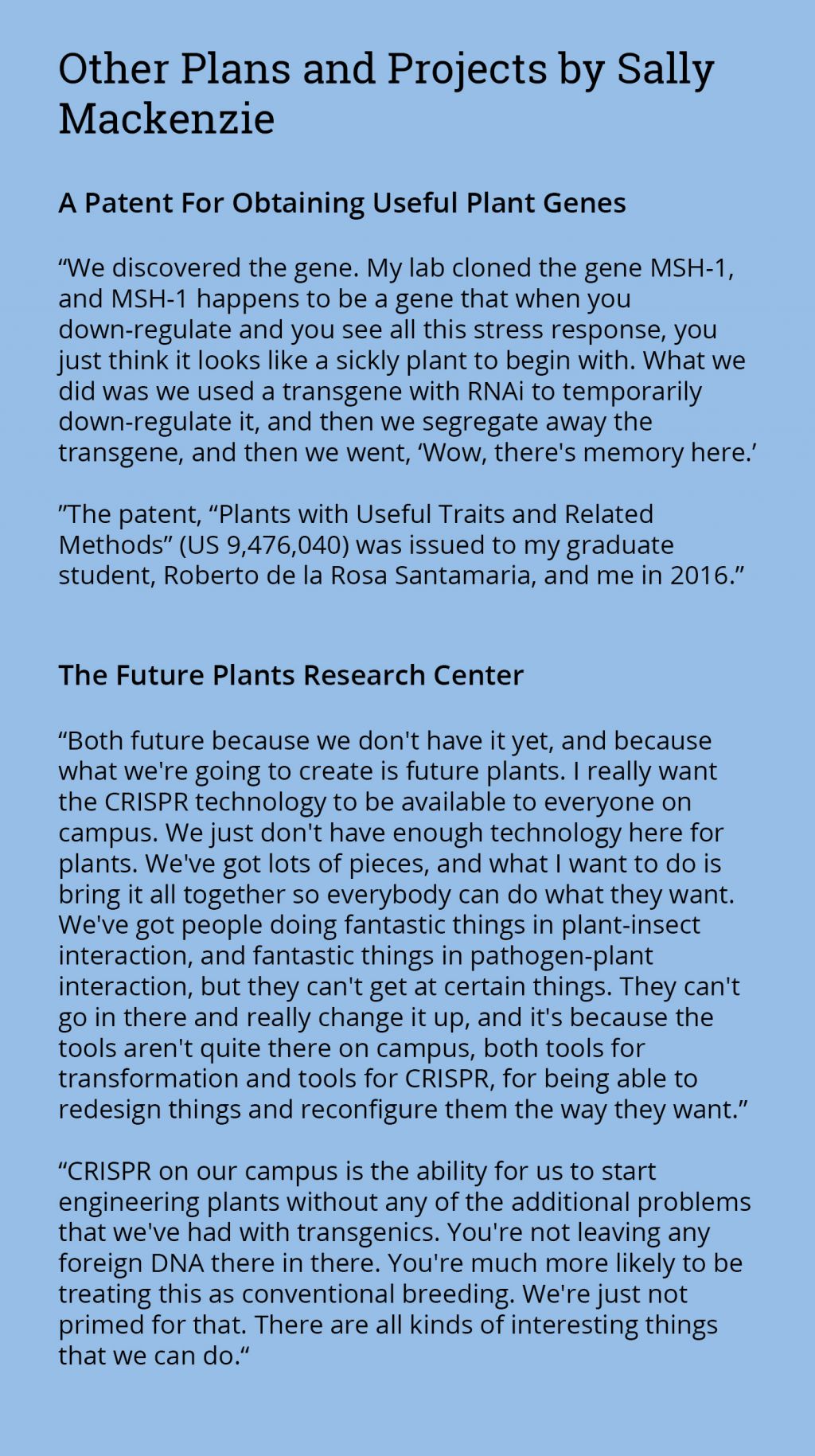Trailblazers: Sally Mackenzie’s Vision for the Future of Plants

Sally Mackenzie has a bold and daring vision for Penn State’s new Plant Institute. As the inaugural director for the unit, which launched in September 2019, she intends to demonstrate the university’s unique capacities to holistically address some of the most daunting challenges facing humanity over the next 50 years.
Mackenzie sees the institute as a unique opportunity for Penn State to mitigate climate change effects through the development of sustainable systems for food production, mitigation of crop disease and insect damage, forest restoration, and modeling and prediction of climate impacts.
“Penn State has all of the pieces to address these issues, including climatology,” Mackenzie said. “We’d like people to feel that we’re really primed right now to bring all of the pieces together to the fore; that there is a sense of not just urgency, but a sense of responsibility to make our work truly relevant to the emerging priorities of the country.”
Climate change means that crops grown today in a particular region will likely not be the crops that will be grown in the future. “Every university has to have some ability to predict the future 50 years out because they have to be prepared to say ‘this is what our state used to do; this is probably what our state is going to do in the future.’ Our economy depends on understanding what the future's going to look like,” she said.
Mackenzie has served as Lloyd and Dottie Huck Chair for Functional Genomics at Penn State since August of 2017. She earned her PhD in Plant Molecular Genetics from the University of Florida, Gainesville, and worked as a professor in the Department of Agronomy at Purdue University. During her tenure at the University of Nebraska-Lincoln, she served as the Ralph and Alice Raikes Distinguished Chair for Plant Science as well as the founding director of the Center for Plant Science Innovation. She is also the inventor of epigenetic discoveries licensed to Epicrop Technologies in Lincoln, a company she cofounded.
Mackenzie’s research in epigenetics might hold one of the keys to making crops more resilient in the face of climate change. Plants are comprised of a certain combination of genes whether they’re bred for a specific purpose or naturally inherit them through evolution; those genes have a range of capabilities in their expression. Understanding the plasticity of plants as they adapt to their environment gives researchers an understanding of what their range is as the climate changes.

Building upon a classic moment of unanticipated scientific discovery, Mackenzie’s laboratory has identified ways to reprogram plants so that they think they're experiencing stress and create changes in their gene expression behavior. This process can be manipulated in the lab, resulting in trait enhancements that can be passed to future generations without changes in the DNA sequence.
“Plant cells have compartments that contain their own genetic information: mitochondria for respiration, chloroplasts for photosynthesis,” Mackenzie explained. Her lab was searching for the nuclear genes that control the replication and recombination of DNA in those compartments, which led to the discovery of the MSH1 gene that is present in all green plants but not found in fungi or mammals. Expression of MSH1 is influenced by environmental conditions, and its suppression by stress can produce changes in mitochondrial and chloroplast behavior and in plant growth patterns.
“We were looking for one of those genes,” Mackenzie said. “We mutated it and we kept thinking, ‘Oh, we're creating mitochondrial mutations. Look at that.’ And none of the data made any sense to us. We'd make reciprocal crosses because that's what you do with mitochondrial mutations. The plants would just get bigger, more vigorous, and higher yielding. That's not the expected outcome. Where did the mutation go? None of this followed Mendel’s rules.”
The eureka moment arrived one day during a lab meeting. “A colleague asked, ‘What if it were epigenetic?’ The light came on for all of us,” she said. “That's it! And then all these pieces that seemed so incongruous just fit together.” Her whole lab shifted into epigenetics.
Epigenetics is not genetic modification; it is the study of how genes are expressed over development and in response to environmental change. “What we’re doing is exploiting what Mother Nature already uses,” Mackenzie explained. “We're not doing anything that plants don't already do. The system we use rigs it in a different way so that we can gain important insight and capture value from it. Other than that, they're the same networks and they're the same pathways that nature modulates. What happens naturally when a plant is subjected to chronic stress is what will to happen within this system.”
Epigenetic reprogramming can enhance stress tolerance and create increased yields of 20-30% in tomatoes. These manipulations have been similarly effective in soybean and sorghum and should be applicable to a range of plant species. Crops can be manipulated to flower and fruit more uniformly and be more drought tolerant.
The fundamental problem is that climate change means all of these processes need to be accelerated. “Darwin's Law of Evolution says that we can deal with just about anything,” Mackenzie said. “And we can deal with what's going to happen with climate change, but not at the rate that it's coming. Breeders can't breed fast enough. Generation times won't be quick enough.”

Her experience in Nebraska, a state defined by the agricultural production of corn, soybeans, wheat, and sorghum, is a contrast to Penn State. “Here, we're very much technology oriented. We're also oriented not just to agriculture but also agroecology and forestry,” she said. “How do you make agriculture sustainable, with a lower footprint in the overall impact on land use? That's one of the challenges for the new institute. In my mind, that's plant science. It requires bold approaches, linking genomics, CRISPR technologies, computational modeling, all of it—to support sustainability and not just agricultural capabilities.
“At Penn State, we don't just take an ‘agriculture is king’ tactic and move it all forward. We have the ability to take a much more holistic and integrated ecological approach. We have great plant pathology, great entomology, great chemical ecology that integrates perfectly with our strengths in plant biology and agricultural production systems. Yet, we also have excellent technologies associated with what agriculture's going to look like next, implementing CRISPR and epigenetic technologies, crop modeling, and big data science. We're a well-kept secret. But I think that this integrated approach is going to be the approach that we're going to have to take, that everyone will have to take.’
At the same time, Mackenzie pointed out, Penn State plant science is not just about agriculture.
“We're not a Midwestern state. Our agriculture is far more multifaceted because while we do horticulture and some agronomy, we also must think about range lands and forestry,” she continued. “Forestry is one of the areas that the U.S. has not invested in sufficiently. Some would argue that we've allowed our forests to languish due to a lack of resources. As a scientist I would say that forest biology research lags behind the technologies we've introduced for our agricultural crops. As a consequence, we haven't thought about resiliency on a forest-level scale. And yet, in Pennsylvania and the East Coast, it's one of our most valuable resources. We're not just about plant science in the lab; we really are about plant sustainability as an ecosystem as well.”

The Plant Institute at Penn State aims to harness interdisciplinary knowledge to transform the future of plants. Currently, there are 85 faculty members of the Institute from the Departments of Agricultural and Biological Engineering, Biochemistry and Molecular Biology, Biology, Chemical Engineering, Chemistry, Ecosystem Science and Management, Entomology, Plant Pathology, and Environmental Microbiology, and Plant Science.
“The Institute will be a voice for plant science on this campus, not only to upper administration, but in terms of the research directions for new hiring and new capabilities. One of the most important issues that we're dealing with right now is facilities, which means we are looking to develop a plant facility that's going to take us to the next level,” Mackenzie said.
“Similarly, our plant biology graduate training program is wonderful right now, but there are things that we really want our students to have that we haven’t had the community resources for. Part of this is going to be new opportunities for training our students in areas that we think they really need, such as computational biology and data mining. We will be looking at interesting ways to interface post-doctoral and graduate students' experiences to allow for peer training and interesting industry interactions,” Mackenzie said.
Her vision includes establishing a program where students will be expected to be involved directly in mining nationally available data from public as well as industry databases. “Part of this can lead into biological tool building,” she explained, “so that we can understand where gene products are at any given time in a plant, and how they interact in networks. We can make these types of resources available to the national and international plant community.’
The Huck Institutes leadership couldn’t be more pleased at the prospects for the new Institute, with Mackenzie at the helm.
“Sally's vision for the new Plant Institute is highly ambitious, and we expect great things from her,” added Read. “She's exactly the kind of leader we love to see at the Huck - one who can bring the disciplines together to perform research that promises to serve society in a really big way."